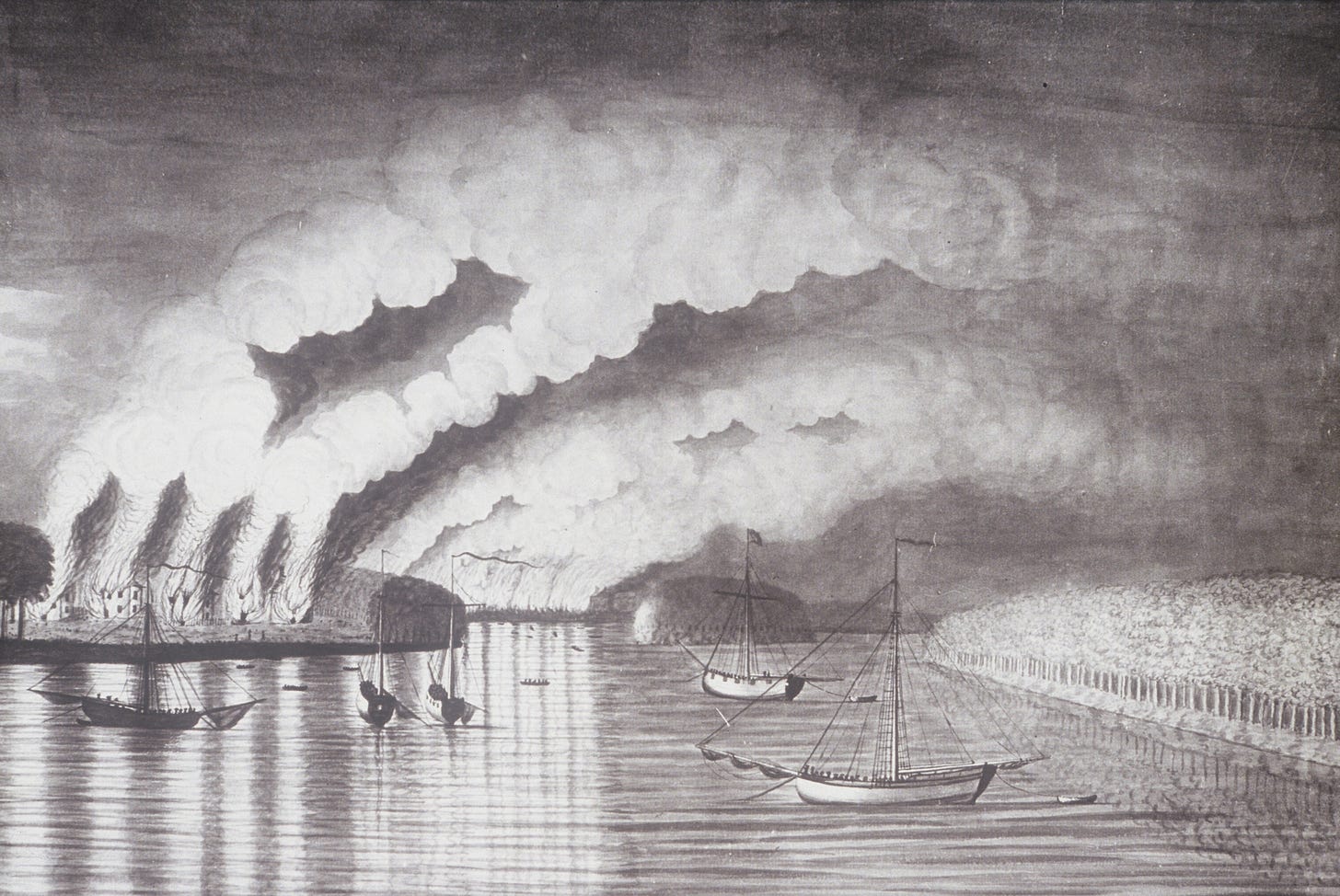Man’s Inhumanity to Man, Examples Thereof: Expulsion of the Acadians
What a Piece of Work I Am, Chapter 34:
The Robertses were descended from displaced Acadians, as were several other families in Babbington, Grandmother’s among them, and like most of the displaced Acadians in Babbington they had abandoned their faith and their old-world allegiances long ago.
Wikipedia, “Expulsion of the Acadians”:
The Expulsion of the Acadians was the forced removal between 1755 and 1764 by Britain of inhabitants of the North American region historically known as Acadia. It included the modern Canadian Maritime provinces of Nova Scotia, New Brunswick, and Prince Edward Island, along with the U.S. state of Maine. The Expulsion occurred during the French and Indian War, the North American theatre of the Seven Years' War.
Prior to 1758, Acadians were deported to the Thirteen Colonies, then later transported to either Britain or France. Of an estimated 14,100 Acadians, approximately 11,500 were deported, of whom 5,000 died of disease, starvation or shipwrecks. Their land was given to settlers loyal to Britain, mostly immigrants from New England and Scotland. The event is largely regarded as a crime against humanity, […]

World Views: Skepticism, Materialism
What a Piece of Work I Am, Chapter 34:
With regard to religion, Grandfather’s attitude was summed up in the skeptical snort. He could be counted on to snort whenever my grandmother and one of her fellow parishioners began talking about church doings. I think that he was, in the sense that Lucretius and Diderot were, a materialist.)
Skepticism […] is a questioning attitude or doubt toward knowledge claims that are seen as mere belief or dogma. […] Formally, skepticism is a topic of interest in philosophy, particularly epistemology.
More informally, skepticism as an expression of questioning or doubt can be applied to any topic, such as politics, religion, or pseudoscience. It is often applied within restricted domains, such as morality (moral skepticism), atheism (skepticism about the existence of God), or the supernatural. […]
Skepticism has been responsible for many important developments in science and philosophy. It has also inspired several contemporary social movements. Religious skepticism advocates for doubt concerning basic religious principles, such as immortality, providence, and revelation. Scientific skepticism advocates for testing beliefs for reliability, by subjecting them to systematic investigation using the scientific method, to discover empirical evidence for them.
Materialism is a form of philosophical monism which holds that matter is the fundamental substance in nature, and that all things, including mental states and consciousness, are results of material interactions of material things. According to philosophical materialism, mind and consciousness are caused by physical processes, such as the neurochemistry of the human brain and nervous system, without which they cannot exist. Materialism directly contrasts with idealism, according to which consciousness is the fundamental substance of nature.
His poem De rerum natura (usually translated as “On the Nature of Things” or “On the Nature of the Universe”) transmits the ideas of Epicureanism, which includes atomism and cosmology. Lucretius was the first writer known to introduce Roman readers to Epicurean philosophy. The poem, written in some 7,400 dactylic hexameters, is divided into six untitled books, and explores Epicurean physics through richly poetic language and metaphors. Lucretius presents the principles of atomism, the nature of the mind and soul, explanations of sensation and thought, the development of the world and its phenomena, and explains a variety of celestial and terrestrial phenomena. The universe described in the poem operates according to these physical principles, guided by fortuna, “chance,” and not the divine intervention of the traditional Roman deities and the religious explanations of the natural world.
In his youth, Diderot was originally a follower of Voltaire and his deist Anglomanie, but gradually moved away from this line of thought towards materialism and atheism, a move which was finally realised in 1747 in the philosophical debate in the second part of his The Skeptic’s Walk (1747). Diderot opposed mysticism and occultism, which were highly prevalent in France at the time he wrote, and believed religious truth claims must fall under the domain of reason, not mystical experience or esoteric secrets.
Have you missed an episode or two or several?
You can begin reading at the beginning or you can catch up by visiting the archive or consulting the index to the Topical Guide. The Substack serialization of Little Follies begins here; Herb ’n’ Lorna begins here; Reservations Recommended begins here; Where Do You Stop? begins here; What a Piece of Work I Am begins here.
You can listen to the episodes on the Personal History podcast. Begin at the beginning or scroll through the episodes to find what you’ve missed. The Substack podcast reading of Little Follies begins here; Herb ’n’ Lorna begins here; Reservations Recommended begins here; Where Do You Stop? begins here; What a Piece of Work I Am begins here.
You can listen to “My Mother Takes a Tumble” and “Do Clams Bite?” complete and uninterrupted as audiobooks through YouTube.
You can ensure that you never miss a future issue by getting a free subscription. (You can help support the work by choosing a paid subscription instead.)
At Apple Books you can download free eBooks of Little Follies, Herb ’n’ Lorna, Reservations Recommended, and Where Do You Stop?
You’ll find overviews of the entire work in An Introduction to The Personal History, Adventures, Experiences & Observations of Peter Leroy (a pdf document), The Origin Story (here on substack), Between the Lines (a video, here on Substack), and at Encyclopedia.com.


